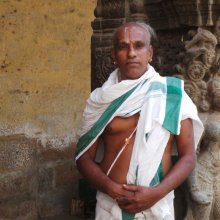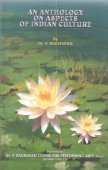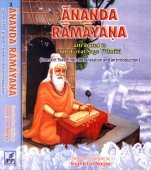Ramanavami, Rāmanavamī, Rama-navami: 14 definitions
Introduction:
Ramanavami means something in Hinduism, Sanskrit, the history of ancient India, Marathi. If you want to know the exact meaning, history, etymology or English translation of this term then check out the descriptions on this page. Add your comment or reference to a book if you want to contribute to this summary article.
Images (photo gallery)
In Hinduism
Vaishnavism (Vaishava dharma)
Source: Pure Bhakti: Brhad BhagavatamrtamRāmanavamī (रामनवमी) refers to:—The appearance day of Śrī Rāma which occurs on the ninth day of the light lunar fortnight of the month of Caitra (March-April). (cf. Glossary page from Śrī Bṛhad-bhāgavatāmṛta).

Vaishnava (वैष्णव, vaiṣṇava) or vaishnavism (vaiṣṇavism) represents a tradition of Hinduism worshipping Vishnu as the supreme Lord. Similar to the Shaktism and Shaivism traditions, Vaishnavism also developed as an individual movement, famous for its exposition of the dashavatara (‘ten avatars of Vishnu’).
Pancaratra (worship of Nārāyaṇa)
Source: archive.org: Catalogue of Pancaratra Agama TextsRāmanavamī (रामनवमी) or Śrīrāmanavamī refers to “Rāma’s birthday celebrations”, as discussed in the twenty-fifth chapter of the Agastyasaṃhitā (agastya-suīkṣṇa-saṃvāda edition), an ancient Pāñcarātra Āgama text dealing with the worship of Rāma, Sītā, Lakṣmaṇa and Hanumān.—[Cf. the chapter śrī-rāmanavamī-praśaṃsā]:—Every year in the caitra-month. on the ninth day when the constellation Punarvasu is there, the birthday of Rāma is to be remembered. Fasting and a vigil should be observed on the “ninth day,” as well as tarpaṇa-rites. Those who break the fast enjoined will go to hell. Alms-giving is also to be practised On the following day ( i.e., the “tenth day”), Rāma and His retinue should be meditated upon with the dvādaśa-mantra, and then worshipped thrice along with the aṣṭākṣara-mantra. Such muttering of these powerful mantras is itself sufficient to yield great results. [...]

Pancaratra (पाञ्चरात्र, pāñcarātra) represents a tradition of Hinduism where Narayana is revered and worshipped. Closeley related to Vaishnavism, the Pancaratra literature includes various Agamas and tantras incorporating many Vaishnava philosophies.
General definition (in Hinduism)
Source: WikiPedia: HinduismRāma Navamī (राम नवमी): A Hindu festival, celebrating of the birth of Lord Rama. The day falls on the Navami, ninth day of the Chaitra month of Hindu lunar year in 'Shukla paksha'.
Source: ACHC: Smarta PujaRāmanavamī (रामनवमी) refers to “Rama’s birthday” and represents a religious observance (vrata) occurring in the month Caitra (March-April).—Rāma-navamī (vrata) (Rāma-jayantī; Rama’s birthday) pūjā of Rama-śukla-navamī.
India history and geography
Source: archive.org: South Indian FestivitiesRama Navami.—Sri Rama Navami is the anniversary of the birth of Sri Rama celebrated by the Hindu devotees in the month of Chaitra ( March-April) on the ninth day of the bright fortnight when the asterism Punavasu (Geminorum) is in the ascendancy. The observance of this Vratha is said to absolve one from all sins. Men of all grades and ranks including Kings observe this Vratha for obtaining prosperity, long life, happiness and wisdom. We may say that the festival is universally observed, and Sri Rama is worshipped inevery conceivable manner.

The history of India traces the identification of countries, villages, towns and other regions of India, as well as mythology, zoology, royal dynasties, rulers, tribes, local festivities and traditions and regional languages. Ancient India enjoyed religious freedom and encourages the path of Dharma, a concept common to Buddhism, Hinduism, and Jainism.
Languages of India and abroad
Marathi-English dictionary
Source: DDSA: The Molesworth Marathi and English Dictionaryrāmanavamī (रामनवमी).—f (S) The ninth day of the light half of caitra, the birthday of Rama.
Source: DDSA: The Aryabhusan school dictionary, Marathi-Englishrāmanavamī (रामनवमी).—f The ninth day of the light half of caitra.
Marathi is an Indo-European language having over 70 million native speakers people in (predominantly) Maharashtra India. Marathi, like many other Indo-Aryan languages, evolved from early forms of Prakrit, which itself is a subset of Sanskrit, one of the most ancient languages of the world.
Sanskrit dictionary
Source: DDSA: The practical Sanskrit-English dictionaryRāmanavamī (रामनवमी).—the ninth day in the bright half of Chaitra, the anniversary of the birth of Rāma.
Rāmanavamī is a Sanskrit compound consisting of the terms rāma and navamī (नवमी).
Source: Cologne Digital Sanskrit Dictionaries: Shabda-Sagara Sanskrit-English DictionaryRāmanavamī (रामनवमी).—f. (-mī) The ninth day in the light-half of Chaitra, the anniversary of the birth of Ramachandra.
Source: Cologne Digital Sanskrit Dictionaries: Monier-Williams Sanskrit-English DictionaryRāmanavamī (रामनवमी):—[=rāma-navamī] [from rāma] f. Name of the 9th day in the light half of the month Caitra (being the birthday of Rāma-candra), [Rāmatāpanīya-upaniṣad; Religious Thought and Life in India 430]
[Sanskrit to German]
Sanskrit, also spelled संस्कृतम् (saṃskṛtam), is an ancient language of India commonly seen as the grandmother of the Indo-European language family (even English!). Closely allied with Prakrit and Pali, Sanskrit is more exhaustive in both grammar and terms and has the most extensive collection of literature in the world, greatly surpassing its sister-languages Greek and Latin.
Kannada-English dictionary
Source: Alar: Kannada-English corpusRāmanavami (ರಾಮನವಮಿ):—
1) [noun] the ninth day of Caitra, the first month of Indian lunar calendar and the day of Rāma’s birth.
2) [noun] the festival observed on that day,3) [noun] ರಾಮನವಮಿ ಸೇವಾರ್ಥ [ramanavami sevartha] rāmanavami sēvārtha (sarc.) consumption or supply of alcoholic liquor or liquors.
Kannada is a Dravidian language (as opposed to the Indo-European language family) mainly spoken in the southwestern region of India.
See also (Relevant definitions)
Partial matches: Navami, Rama.
Starts with: Ramanavaminirnaya, Ramanavamipuja, Ramanavamivrata, Ramanavamivratakatha, Ramanavamivratamahatmya.
Ends with: Ci-ramanavami, Shriramanavami.
Full-text: Ramanavamipuja, Ramanavaminirnaya, Ramanavamivratamahatmya, Ramanavamivratakatha, Ci-ramanavami, Shriramanavaminirnaya, Shriramanavami, Pankuni, Ramagola, Sitamantra, Dvadashamantra, Ashtaksharamantra, Shadaksharamantra.
Relevant text
Search found 9 books and stories containing Ramanavami, Rāmanavamī, Rama-navami, Rāma-navamī, Rāmanavami, Rāma-navami; (plurals include: Ramanavamis, Rāmanavamīs, navamis, navamīs, Rāmanavamis). You can also click to the full overview containing English textual excerpts. Below are direct links for the most relevant articles:
Garga Samhita (English) (by Danavir Goswami)
Verses 3.10.31-37 < [Chapter 10 - The Glory of Śrī Girirāja]
Verses 3.10.28-30 < [Chapter 10 - The Glory of Śrī Girirāja]
Temples in and around Madurantakam (by B. Mekala)
Sri Govindaraja Perumal Temple < [Chapter 3 - Temples of Madurantakam Taluk]
Sri Adi Kesava Perumal Temple < [Chapter 3 - Temples of Madurantakam Taluk]
Sri Adhikesava Perumal Temple < [Chapter 3 - Temples of Madurantakam Taluk]
Brihad Bhagavatamrita (commentary) (by Śrī Śrīmad Bhaktivedānta Nārāyana Gosvāmī Mahārāja)
Verse 2.1.199 < [Chapter 1 - Vairāgya (renunciation)]
Masti Darsana < [October – December, 1984]
Reviews < [April-June 1942]
Masti’s Contribution to Kannada Literature < [October – December, 1984]
Srila Gurudeva (The Supreme Treasure) (by Swami Bhaktivedanta Madhava Maharaja)
Entering Naiśa-līlā (the Night Pastimes) < [Chapter 2.19 - The Concluding Transcendental Pastimes]
The Devi Bhagavata Purana (by Swami Vijñanananda)
Related products




